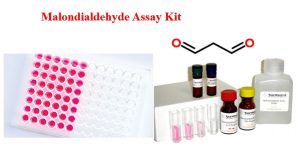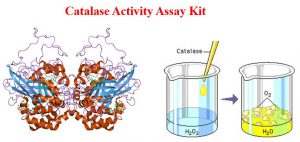PTC New products:
Urine Iodine determination Kit
Iodine is an essential constituent of the thyroid hormones (T4, T3). The major role of iodine in nutrition arises from the important part played by the thyroid hormones in the growth and development of humans and animals. Although goiter is indeed the visually obvious and familiar feature of iodine deficiency, of other consequences of iodine deficiency enhanced knowledge has led to the many the effects of iodine deficiency on growth and development being now denoted by the term iodine-deficiency disorders (IDD). The most important information in the determination of the status of iodine nutrition of a given population comes from the measurement of the urinary iodine. Therefore, assessment of iodine deficiency and monitoring of iodine supplementation programs demands rapid, simple and cost-effective methods for the determination of urinary iodide concentrations.
PTC offered its new product UI (Urinary Iodine) kit according highest standard, for sensitive and precise determination of iodine in urine samples and detecting iodine deficiency in suspected person especially pregnant women. This product is the first and at this time only product which helps physicians to detect and early treatment of IDD.
False Negative Free assay kit for Drug abuse detection
About 275 million people worldwide, which is roughly 5.6 per cent of the global population aged 15–64 years, used drugs at least once during 2016. Drug abuse detection in many countries is obligatory in some situations such as employment, marriage. Adulteration and causing false negative results a big problem which PTC’s R&D scientists with good experience in this field solved it and offer a confident assays range with free false negative results. The main goal of PTC was, optimization, standardization, and production of accurate, sensitive and precise ready to use assay kits for detection Adulteration in any screening or confirmatory tests, especially for drug abuse detection. The unique selling points is its innovation, high quality and low cost product.
Total Polyphenol Content (TPC) Assay Kit
Researchers trusted to measure the total amount of polyphenols in various biological samples
Phenolic compounds play a very important role in the prevention of many chronic diseases. These compounds are the main antioxidants in the human diet and have antimicrobial, anti-inflammatory, anti-mutagenic, anti-cancer, anti-allergic and vasodilation activities. Therefore, measuring the total amount of polyphenols seems to be of particular importance. Total Polyphenol Detection Kit by PTC Iran, a simple, sensitive, repeatable and standard microplate colorimetric method for measuring TPC levels in various biological samples such as plasma, natural beverages, food, extract Provides fruit, serum, urine, saliva, tissue, cell culture supernatant, lysed cells, and other biological fluids. In this method, a color combination with maximum light absorption is created at a wavelength of 760 nm. The detection range of this kit is about 3.12-200 µg / ml and its sensitivity or detection limit is 1 /g / ml.
Padgin Teb Co. 96 tests (CAT No. PTC-TPC-96A) and 46 tests (CAT No. PTC-TPC-48A), one day delivery
Malondialdehyde Assay Kit
Researchers trusted to measure Malondialdehyde in various biological and non-biological samples
Malondialdehyde (MDA) is an organic compound and a colorless liquid with the chemical formula CH2 (CHO) 2. This compound is the end product of fatty acid peroxidation and is a sign of oxidative stress. Therefore, by measuring the values of MDA, we can find out the degree of oxidation of fatty acids and oxidative stress in the living body. Malondialdehyde is highly active and potentially a potent mutagenic compound. This compound is produced in large quantities in highly heated edible oils such as sunflower oil and palm oil and plays a very important role in causing cancer. Malondialdehyde Assay Kit by PTC Iran, a simple, sensitive and accurate colorimetric method for measuring MDA in various biological samples (serum, plasma, urine, tissue, lysed cells and supernatant of cell culture medium) and other Provides bio (food industry). The basis of this kit is the production of pink dye as a result of MDA reaction with thiobarbituric acid at high temperature and measuring the absorption of this dye at a wavelength of 535 nm. The detection range of this kit is 0.78-50 µM and its sensitivity or detection limit is 0.1M.
Padgin Teb Co. 96 tests (CAT No. PTC-MDA-96A) and 46 tests (CAT No. PTC-MDA-48A), one day delivery

Nitric Oxide Assay Kit
Trusted by researchers to measure nitric oxide levels in various biological samples
Nitric oxide (NO) is a colorless gas and one of the main oxides of nitrogen. This compound is a free radical with an unpaired electron and acts as one of the important messengers in the path of cellular messaging. Nitric oxide is made by various enzymes that make nitric oxide (NOS) from compounds such as L-arginine, oxygen and NADPH. Various studies have shown the relationship between NO and various diseases, and in recent years, research in this field has attracted the attention of researchers. NO Detection Kit, Product of PTC, a simple, sensitive, repeatable and standard colorimetric method for measuring NO levels in various biological samples such as plasma, serum, saliva, urine, tissue, cell culture supernatant, cell Provides lysis and other biological fluids. Because the half-life of NO is very short, its values are determined indirectly by measuring the levels of nitrite and nitrate. The measurement method in this kit generally consists of two steps. In the first step, endogenous nitrite levels are determined. In the second step, using a reducing agent, nitrate is converted to nitrite and total nitrite values are measured. To calculate the amount of nitrate, the amount of endogenous nitrite is subtracted from the total nitrate. Nitrite and nitrate, with a dye reagent, form a pink compound that has a maximum light absorption at 540 or 550 nm. The detection range of this kit is about 3.12-100 µ and its sensitivity or detection limit is 1 .M.
Padgin Teb Co. 96 tests (CAT No. PTC-NO-96A) and 46 tests (CAT No. PTC-NO-48A), one day delivery
Total Antioxidant Capacity (TAC)
Trusted by researchers to measure the total antioxidant capacity of various biological samples
Antioxidants play a very important role in eliminating and preventing the formation of free radicals and other toxic oxidizing species. In general, there are three main groups of antioxidant species: enzyme systems (GSH Reductase, catalase, and peroxidase), small molecules (ascorbate, uric acid, GSH, vitamin E) and proteins (Albumin and transferrin). Different antioxidants differ in their ability to reduce. Measurement of non-enzymatic antioxidant capacity in biofluids and other samples provides an indication of the total capacity to neutralize reactive oxygen species (ROS), resist oxidative damage, and combat oxidative stress-related diseases. In some cases, the antioxidant function of proteins is desired, while in other cases, the antioxidant function of small molecules is required. The full antioxidant capacity kit from the Iranian company PTC provides a simple and sensitive colorimetric method for measuring a combination of small antioxidant molecules and antioxidant proteins or small antioxidant molecules alone. Slowly In this kit, Cu2 + ions are converted to Cu + by small molecules and antioxidant proteins. A protein mask inhibits the reduction of Cu2 + ions, and at this point only the antioxidant properties of small molecules can be analyzed. Using a colorimetric probe, the Cu + ion will show the maximum absorption at 490 nm, which is directly related to the total antioxidant capacity. The detection range of this kit is 0.2-125 mM and its sensitivity or detection limit is approximately 0.1 mM.
Padgin Teb Co. 96 tests (CAT No. PTC-TAC-96A) and 46 tests (CAT No. PTC-TAC-48A), one day delivery
Glutathione Assay Kit
Researchers trusted to measure glutathione levels in various biological samples
Glutathione (GSH) is a tripeptide consisting of the three amino acids cysteine, glutamic acid and glycine, which are made naturally in the human liver. This compound is a very powerful antioxidant and is used in the purification of toxic compounds, including compounds produced as a result of oxidative stress. Glutathione is part of the immune system against mutagenic, carcinogenic and toxic effects of these compounds, because toxic free radical compounds combine with it and are eliminated from the body. Today, extensive research on Drugs that target the GSH pathway and related enzymes are being developed, and GSH measurement is an important part of these studies. Glutathione Detection Kit, produced by the Iranian company PTC, a simple, sensitive, reproducible and standard colorimetric method for measuring glutathione levels in various biological samples such as plasma, serum, saliva, tissue, cell culture supernatant, lysed cell And provides other biological fluids. With this kit, total glutathione or its reduced shape can be measured. The basis of this kit is the reaction of glutathione with DNTP. As a result of this reaction, 2-nitro5-benzoic acid is produced with a yellow color. Therefore, the concentration of glutathione is determined by measuring the optical absorption of the solution obtained at a wavelength of 412 nm. The detection range of this kit is about 1-03 mM and its sensitivity or detection limit is 0.01 mM.
Padgin Teb Co. 96 tests (CAT No. PTC-GSH-96A) and 46 tests (CAT No. PTC-GSH-48A), one day delivery
Glutathione Peroxidase Activity Assay Kit
Researchers trusted to measure glutathione peroxidase activity in various biological samples
Glutathione peroxidase (GPX) is the general name of a family of enzymes with peroxidase activity whose main role is to protect the body from oxidative damage. The biochemical function of glutathione peroxidase is to reduce lipid hydroperoxidases to their corresponding alcohols and to reduce hydrogen peroxide to water. Studies have shown low serum and plasma levels of this enzyme in diseases such as vitiligo, MS and type 2 diabetes. Due to the increasing prevalence of these patients, research in this field has also increased. GPX Enzyme Activity Assay Kit, manufactured by the Iranian company PTC, is a simple, sensitive, reproducible and standard colorimetric method for measuring GPX activity in various biological samples such as plasma, serum, urine, tissue, cell culture supernatant, cell lysed and provides other biological fluids. In this kit, the GPX enzyme uses GSH as the final electron donor and converts it to GSSG, the remaining GSH reduces DTNB and produces a yellow color with a maximum absorption at 412 nm. The intensity of absorption of this color will be inversely proportional to the activity of GPX. The detection range of this kit is about 20-500 U / mL and the sensitivity or detection limit is 5 U / mL.
Padgin Teb Co. 96 tests (CAT No. PTC-GPX-96A) and 46 tests (CAT No. PTC-GPX-48A), one day delivery
Catalase Activity Assay Kit
Trusted by researchers to measure the activity of the enzyme catalase in various biological samples
Catalase (CAT) is a peroxisomal enzyme with four Heme-containing polypeptide chains and plays a very important role in the breakdown of oxygenated water (H2O2). This enzyme converts H2O2 to water and oxygen and inhibits its toxic effects on living cells. In eukaryotic cells, hydrogen peroxide is formed as a result of various oxidation and superoxide dismutase reactions. Accumulation of hydrogen peroxide inside cells leads to oxidation of DNA, proteins, fats, resulting in mutations and cell death. Therefore, the removal of this toxic compound from the cells by the enzyme catalase has a protective role against oxidative damage. In humans, large amounts of this enzyme are found in the liver, kidneys and red blood cells. Catalase Enzyme Assay Kit, manufactured by the Iranian company PTC, is a simple, sensitive, reproducible and standard colorimetric method for measuring catalase activity in various biological samples such as plasma, serum, saliva, semen, tissue, lysed cells and others. Provides biological fluids. After performing the measurement steps, the light absorption of the final compound at a wavelength of 405 nm is read. The detection range of this kit is 1-100 U / mL and the sensitivity or detection limit is approximately 0.5 U / mL.
Padgin Teb Co. 96 tests (CAT No. PTC-CAT-96A) and 46 tests (CAT No. PTC-CAT-48A), one day delivery

Paraxonase ELISA Kit
Researchers trusted to measure Paraxonase levels in various biological samples
Paraxonase (PONs) are a family of enzymes in mammals that are active in aryl alkyl phosphatase. Three isoenzymes have been identified in association with Paraxonase. This enzyme prevents LDL oxidation and reduces the risk of atherosclerosis. In recent years, this enzyme has been reported to be associated with some diseases, including cardiovascular disease, atherosclerosis, liver failure, and diabetes. Therefore, studies in this field are expanding and the measurement of Paraxonase is a necessity of these studies. The ELISA kit for measuring human Paraxonase, produced by ZellBio, is an immunoassay based on ELISA sandwich that uses two monoclonal antibodies against two separate antigen sites on the Paraxonase molecule. Finally, the amount of Paraxonase is determined by measuring the absorbed light of the solution obtained at a wavelength of 450 nm. High safety, sensitivity, specificity and high accuracy are the important advantages of this method. The detection range of this kit is about 3-96 ng / ml and its sensitivity or detection limit is 0.15 ng / ml.
Padgin Teb Co. CAT No: PTC-PON-96A, one day delivery
Vitamin C Assay Kit
Researchers trusted to measure the levels of vitamin C in various biological samples
Vitamin C (Vit C, ascorbic acid) is a 6-carbon lactone produced by plants and some animal species (but not in humans or other primates). This vitamin acts as an enzyme cofactor for several enzymes and is used as an electron donor to monooxygenases and dioxygenases. Vitamin C also acts as a very powerful antioxidant, especially in relation to reactive oxygen species. Given the important role and function of this compound in many biological processes, its measurement in related studies seems necessary. Vitamin C assay kit, manufactured by the Iranian company PTC, a simple, sensitive, repeatable and standard microplate colorimetric method for measuring the amount of vitamin C in various biological samples such as plasma, serum, urine, saliva, tissue, fluid. Provides cell culture surface, cell lysed and other biological fluids. In this method, a color complex with a maximum absorption of 520 nm is created. The detection range of this kit is more than 20 /g / ml and its sensitivity or detection limit is 1 /g / ml.
Padgin Teb Co. 96 tests (CAT No. PTC-VC-96A) and 46 tests (CAT No. PTC-VC-48A), one day delivery
Rat Glucose Assay Kit
Researchers trusted to measure the levels of Rat Glucose in serum/plasma samples
Glucose (C6H12O6) is the main biofuel for the production of an energy molecule called ATP. Glucose level is the main diagnostic parameter for many metabolic diseases and its measurement is very important in research work and drug discovery processes. Glucose Assessment Kit, a product of Padgin Teb Company, allows direct measurement of glucose levels in various biological samples (such as serum, plasma, other body fluids, food and culture medium) in rats. The enzymatic compound specifically oxidizes glucose to produce the dye with maximum absorption at 546 wavelengths. The intensity of the color created is directly proportional to the amount of glucose in the sample. This method is very simple, fast and sensitive and is suitable for monitoring glucose levels during fermentation and gene expression processes. The sensitivity or detection limit of this kit is 1 mg / dL.
Padgin Teb Co. CAT No: PTC-GLC-96A, one day delivery
Vitamin D ELISA Assay Kit
Researchers trusted to measure the amount of vitamin D in various biological samples
Vitamin D or calciferol (25-Hydroxy Vitamin D or 25 (OH) Vitamin D), is a fat-soluble vitamin and essential for the body to control the balance of calcium and phosphorus for bone growth and strength. Osteoporosis is a major complication of vitamin D deficiency. ELISA Kit for Measuring Vitamin D in Humans, by PTC, is a competitive ELISA-based immunoassay that competes for a limited number of antibodies attached to microplate wells between vitamin Ds. Available in standards as well as vitamin D in an unknown sample (human samples including serum, plasma, cell culture medium, lysed cells and other biological fluids) occurs with enzyme-linked vitamin D. Finally, the amount of vitamin D is determined by measuring the absorption of the solution obtained at a wavelength of 450 nm. This method measures both vitamin D2 and D3. High safety, sensitivity, specificity and high accuracy are the important advantages of this method. The detection range of this kit is about 2.5-1.5 ng / ml and its sensitivity or detection limit is 0.67 ng / ml.
Padgin Teb Co. CAT No. PTC-11537-96A, one day delivery
